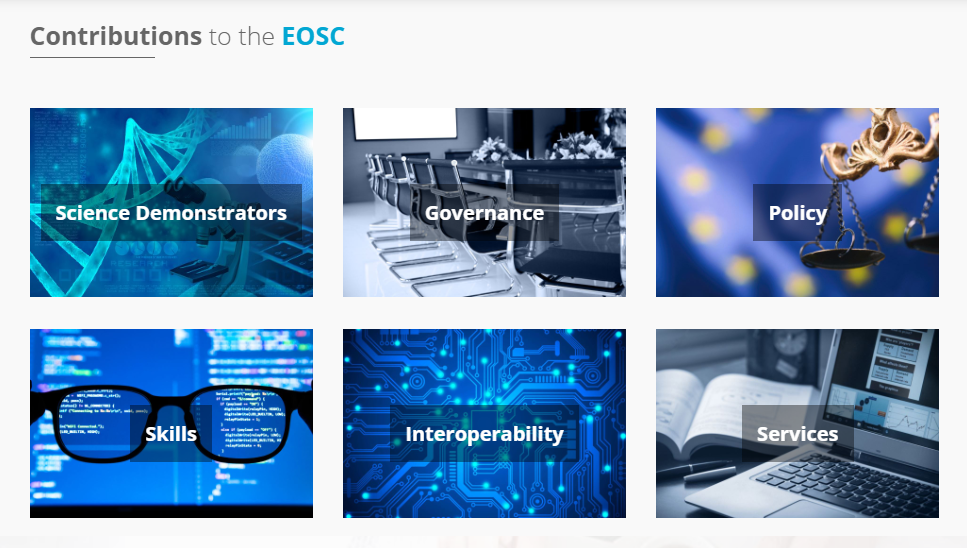
EOSCpilot Rounds Up Key Contributions to the EOSC
As EOSCpilot officially ended last week, 31 May 2019, we take a look back at some of the key contributions of the project to the development of the European Open Science Cloud (EOSC).
EOSCpilot is the first funded project that provided a clear starting point and would provide the foundational work needed to build the EOSC.
Across more than two years, the project delivered significant contributions to the EOSC in the areas of governance, policies, interoperability, architecture, and services, and provided the first "EOSC in practice" - the EOSC science demonstrators. Having delivered these, EOSCpilot has established its legacy and its outputs now are used by several other projects funded to establish the EOSC.
“EOSCpilot has defined the scope of the EOSC and provided the basis for something that was previously inexistent. The EOSC is now launched thanks to projects such as this, which have helped pave the way for what we have today.”
- Jean-Claude Burgelman, European Commission - Research and Innovation Director General,
EOSC Stakeholders Forum 2019
Governance
With plenty of stakeholders expected to rely on the European Open Science Cloud in the future, it became clear that governing the EOSC and ensuring neutral and transparent management will be of great importance for its success. Through its engagement with future EOSC actors, EOSCpilot provided a governance framework that became the basis for the current EOSC governance structure we see today and a minimal set of rules of play was proposed.
See:
- EOSCpilot's Contributions to EOSC Governance
- EOSC Post-2020 Governance Structure Proposed By EOSCpilot
Policy
Prior to EOSCpilot, there was very little guidance on the appropriate policies from a national level, up to an institutional level. Clearly, the policy environment then was not conducive, nor ready for a European Open Science Cloud (EOSC). But through a multi-pronged approach, EOSCpilot has set the foundational efforts needed that other follow-on projects will take forward.
See:
- EOSCpilot's Contributions to EOSC Policy
- EOSCpilot's 9 Recommendations For EOSC Policy
- 3 Major Updates To EOSC Policy-Supporting Services
Services
EOSCpilot has produced the first concrete proposals for what services should be included and offered in the future European Open Science Cloud (EOSC), enabled understanding of service needs through pilot services, and provided a practical roadmap for services to be included in the EOSC.
See:
- EOSCpilot's Contributions to EOSC Services
- Pioneering Blueprint Delivered For EOSC Service Architecture
- An EOSC Roadmap For Service Portfolio
Interoperability
The success of the EOSC relies strongly on the ability to interconnect data and e-infrastructures, necessary to serve the diverse landscape of European research infrastructures. The EOSC interoperability heavily relies on the EOSC architecture capacity, which allows not only data-sharing between cross-disciplinary, but also ensures a high degree of re-usability. The FAIR principles are considered a key to the construction of the EOSC, since they provide guidance and overcome the fragmentation and inefficiencies that increase data reuse effectively. A gap analysis on technical and political barriers that prevent the interconnection of e-infrastructures and the application of FAIR principles was performed.
See:
- EOSCpilot's Contributions to EOSC Interoperability
- EOSCpilot Delivers Final EOSC Architecture Recommendation
- EOSC Data Interoperability Ensures Availability Of Scientific Data
Skills
Developing and sustaining the skills of researchers, research support staff and EOSC service providers is essential for the success of the EOSC vision. EOSCpilot developed FAIR4S, a competence and capability framework drawing from existing frameworks for data science, data librarianship and data literacy.
FAIR4S focuses on the skills to make data FAIR and keep it FAIR, offering guidance for EOSC service providers, research performing organisations and individuals on the competences they need, and the learning resources freely available. Coupled with this, recommendations for organisations and the EOSC governance on ensuring adequate support infrastructure for training were developed, including a registry of learning resources.
See:
First Set of EOSC in Practice
Science demonstrators provided EOSCpilot and the overall EOSC community with insights on how to implement EOSC from a practical point of view. As the first demonstrators tackling EOSC-specific implementation challenges, these demonstrators are considered as the first set of EOSC in Practice cases.
See:
